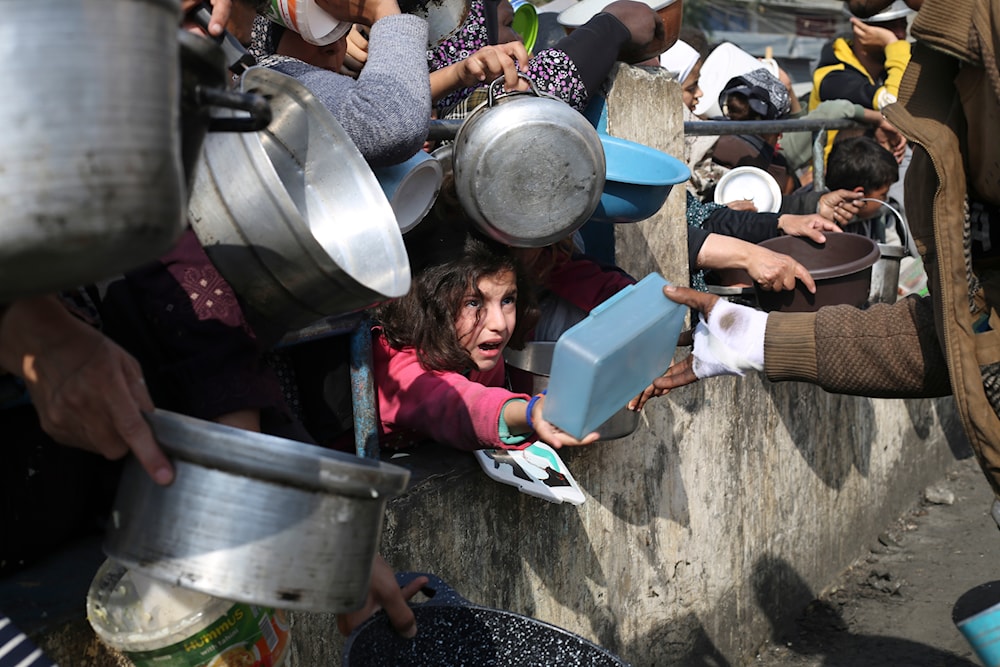UN says aid to Gaza diminishing following closure of Rafah crossing
UN spokesperson Stephane Dujarric says the diminishing aid to Gaza due to the Israeli blockade is causing hospitals and aid organizations to lose their ability to offer services to Palestinians.
-

Palestinians line up for free food during the ongoing Israeli air and ground offensive on the Gaza Strip in Rafah, occupied Palestine, January 9, 2024 (AP)
Aid entry to Gaza has significantly decreased following the Israeli closure of the Rafah border crossing, UN Secretary-General spokesperson Stephane Dujarric said on Wednesday.
According to Dujarric, aid has decreased by 67% since the Israeli occupation closed the Rafah crossing, one of the key entryways for aid to Gaza, on May 7.
According to Dujarric, the intense Israeli bombardment of Rafah, coupled with the reduction in aid, has led to hospitals and relief organizations ceasing their operations at a time of urgent need for medical attention as dozens are suffering life-threatening injuries on a daily basis.
"Israeli bombardment and the drastic reduction in aid have caused hospitals and relief institutions to halt their services, leading to a new wave of displacement," Dujarric stated.
Thus far, the Karam Abu Salem crossing remains the only way for Gaza to receive foreign aid, and it had been shut down by the Israeli occupation in early May before operations resumed there on Sunday.
Moreover, this comes as the US bid to "administer aid" to Gaza - which could be a thinly veiled bid for a far more sinister plot - i.e., the military pier off the shore of Gaza, is being removed for repairs, meaning it will not be used to deliver aid at a time when the people of Gaza need it most.
The reconstruction of the pier at the port of Ashdod is expected to take more than a week, according to Pentagon spokesman Sabrina Singh.
NBC News had reported on Tuesday, citing unnamed officials, that the US has suspended seaborne 'aid deliveries' after bad weather damaged the so-called 'temporary pier' it had set up along the Gaza coastline.
The broadcaster said that the announcement from the US military is expected later on Tuesday, according to a report citing sources including a UN official, a US official, and an Israeli official.
Since its plan was revealed, The real purpose of the pier has been widely speculated, as it can represent the basis for a future permanent US military base on the shores of Palestine under the pretext of delivering aid.
The pier could also serve as a choke point for aid in the post-war situation, as such deliveries could be linked to political pressure on the people of Gaza and the resistance to submit to future US dictates.
With the Israeli control of the Rafah border crossing with Egypt, the Israelis now control all entry points to Gaza.
It is worth noting that the Pentagon allocated $320 million and deployed 1,000 soldiers and sailors to establish the pier. The mission reportedly involved fourteen ships from the US and other countries. At the same time, the US sent billions of dollars of weapons to "Israel" amid its genocide in Gaza.
Weather conditions present a significant challenge, with rough seas in the Mediterranean posing a threat to the pier's integrity and safety. Storms delayed the installation process, and further interruptions are possible. While the summer months are anticipated to be relatively calm, operations may need to cease by September, necessitating the dismantling of the pier.

 3 Min Read
3 Min Read








